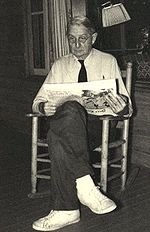
John Maurice Clark
Encyclopedia

Economist
An economist is a professional in the social science discipline of economics. The individual may also study, develop, and apply theories and concepts from economics and write about economic policy...
whose work combined the rigor of traditional economic analysis with an "institutionalist"
Institutional economics
Institutional economics focuses on understanding the role of the evolutionary process and the role of institutions in shaping economic behaviour. Its original focus lay in Thorstein Veblen's instinct-oriented dichotomy between technology on the one side and the "ceremonial" sphere of society on the...
attitude.
Academic career
Clark studied at Amherst CollegeAmherst College
Amherst College is a private liberal arts college located in Amherst, Massachusetts, United States. Amherst is an exclusively undergraduate four-year institution and enrolled 1,744 students in the fall of 2009...
, graduating in 1905, and received his Ph.D. from Columbia University
Columbia University
Columbia University in the City of New York is a private, Ivy League university in Manhattan, New York City. Columbia is the oldest institution of higher learning in the state of New York, the fifth oldest in the United States, and one of the country's nine Colonial Colleges founded before the...
in 1910. He was an Instructor at Colorado College
Colorado College
The Colorado College is a private liberal arts college in Colorado Springs, Colorado, United States, in the foothills of the Rocky Mountains. It was founded in 1874 by Thomas Nelson Haskell...
(1908–1910) and at Amherst College (1910–1915). In 1915 he joined the faculty of political economy at the University of Chicago
University of Chicago
The University of Chicago is a private research university in Chicago, Illinois, USA. It was founded by the American Baptist Education Society with a donation from oil magnate and philanthropist John D. Rockefeller and incorporated in 1890...
. He accept a professorship at Columbia in 1926, where he remained until he retired in 1957.
Contributions
Throughout his career Clark was concerned with the dynamics of a market economyMarket economy
A market economy is an economy in which the prices of goods and services are determined in a free price system. This is often contrasted with a state-directed or planned economy. Market economies can range from hypothetically pure laissez-faire variants to an assortment of real-world mixed...
, or Competition as a Dynamic Process, the title of his last work. In Studies in the Economics of Overhead Costs, Clark developed his theory of the acceleration principle
Accelerator effect
The accelerator effect in economics refers to a positive effect on private fixed investment of the growth of the market economy . Rising GNP implies that businesses in general see rising profits, increased sales and cash flow, and greater use of existing capacity...
, that investment demand can fluctuate widely when consumer demand fluctuates; in this he anticipated key Keynesian theories of investment and business cycles. Clark is considered one of the founders of the theory of workable competition
Monopolistic competition
Monopolistic competition is imperfect competition where many competing producers sell products that are differentiated from one another...
, neither pure competition nor pure monopoly, a neglected Marshallian
Alfred Marshall
Alfred Marshall was an Englishman and one of the most influential economists of his time. His book, Principles of Economics , was the dominant economic textbook in England for many years...
insight.
With his theory of X-efficiency, Harvey Leibenstein
Harvey Leibenstein
Harvey Leibenstein was a Ukrainian born American economist. One of his most important contributions to economics was the concept of X-efficiency....
demonstrated that the measurability of the market price
Market price
In economics, market price is the economic price for which a good or service is offered in the marketplace. It is of interest mainly in the study of microeconomics...
of products in a monopoly
Monopoly
A monopoly exists when a specific person or enterprise is the only supplier of a particular commodity...
is very difficult to obtain.
John Maurice Clark was the son of John Bates Clark
John Bates Clark
John Bates Clark was an American neoclassical economist. He was one of the pioneers of the marginalist revolution and opponent to the Institutionalist school of economics, and spent most of his career teaching at Columbia University.-Biography:Clark was born and raised in Providence, Rhode...
, and shared his view of the importance of ethical and policy issues. Both father and son worked jointly on the revision of John Bates Clark's The Control of Trusts (1914), work continued by John Maurice in Social Control of Business (1926, revised in 1939).
Clark was President of the American Economic Association in 1935, and was awarded the Francis A. Walker Medal in 1952 (the highest honor of the AEA).
Works
- Standards of Reasonableness in Local Freight Discriminations (1910)
- Studies in the Economics of Overhead Costs Chicago, University of Chicago Press (1923) ISBN 0-312-16525-0
- Social Control of Business (1926)
- The Costs of the World War to the American People (1931)
- Strategic Factors in Business Cycles (1934)
- The Economics of Planning Public Works (1935)
- Preface to Social Economics (1936)
- An Alternative to Serfdom (1948)
- The Ethical Basis of Economic Freedom (1955)
- Economic Institutions and Human Welfare (New York, Knopf, 1957, Library of Congress# 57005796)
- Competition as a Dynamic Process (1961)
Literature
- Laurence Shute, John Maurice Clark: A Social Economics for the Twenty-First Century, London, Macmillan (1997) ISBN 0-312-16525-0
- Charles A. Hickman, J. M. Clark, New York, Columbia University Press, (1975) ISBN 0231031874
- Joseph Dorfman, The Economic Mind in American Civilization, (5 vols., (1946–1959)
- T.W. Hutchison, A Review of Economic Doctrines, 1870-1929 (1953)
See also
- History of economic thoughtHistory of economic thoughtThe history of economic thought deals with different thinkers and theories in the subject that became political economy and economics from the ancient world to the present day...

